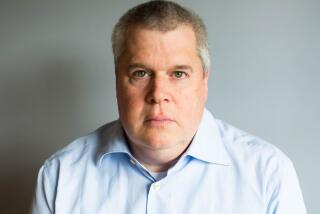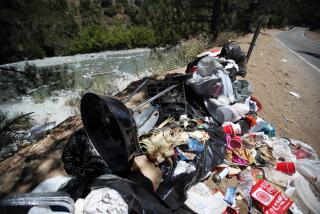Filters Against Folly : HOW TO SURVIVE DESPITE ECONOMISTS, ECOLOGISTS, AND THE MERELY ELOQUENT by Garrett Hardin (Viking: $15.95; 240 pp.)
- Share via
The book is much better than its title, and the argument is much deeper than its gimmick. The gimmick--or filters--has to do with three varieties of intellectual activity: a literate filter for the precise understanding of words; a “numerate filter” for matters of how much and proportions; and an “ecolate filter” permitting a person to judge in terms of time. “And then what?” is a repeated refrain, applied to issues of development, conservation and scale in a work about language, figures and consequences.
Author Garrett Hardin, a professor emeritus at UC Santa Barbara and a prolific puncturer of conventional wisdom, admits that the book grew out of a single lecture. The inflation shows; the chief virtues are the discrete parts, chapters of wisdom on such questions as elected officials versus long-term decisions, a similar nearsightedness among economists, an overload of information in a data-based society and “global problems.”
We never had “global” issues until after World War II, when suddenly the phrase “became an incantation whereby a speaker could signal to others that he was a person of unlimited compassion.” The trouble with raising issues to universal status is that many issues do not lend themselves to world-wide solutions. “Globalization,” warns Hardin, “favors evasion. The wise rule to follow should be plain: Never globalize a problem if it can possibly be dealt with locally.” Local action, he insists, works better at solving local problems, and he proves his point in a parable about world potholes.
Other words impede both understanding and intelligent response. “Infinity,” Hardin insists, is a “thought-stopper,” violating precision and usually distorting a term with technical meaning in mathematics. While scientists have use for infinity, most of us invoke it to avoid dealing with difficult--and sometimes quite quantifiable--questions. Many words are designed to thwart argument: non-negotiable, self-evident, imperative; the person using such terms doesn’t want discussion--he or she wants acquiescence.
Echoes of Alfred Korzybski and the general semanticists appear in the insistence on specific language. So do overtones of E. F. Schumacher’s “Small Is Beautiful” thesis.
But Hardin is his own thinker, and he does a most persuasive job of demonstrating the weaknesses in both capitalism and communism, the imprecisions of pasting those labels on modern societies where neither socialistic nor free enterprise systems are unalloyed.
He can explore the arguments about modern medicine and agree that compassion may overcome principle as well as practicality in treating patients, extremely young ones and extremely old ones. “For a physician to try his hardest to save a life did little harm,” writes Hardin, “so long as medicine was relatively impotent. Heroic medicine is a child of modern technology which has grown explosively in the past half-century, giving physicians powers that Hippocrates never dreamed of. The media have made a bad situation worse by reporting the latest medical extravagances as if they were sporting events. What records have been broken today?”
And then what? Hardin says the lives of individuals rescued by medical science are often miserable, plagued by chronic trouble. The families are slaved to the constant needs of “the flawed human being.” Finally, we all pay those bills and there may be better places to spend our compassion: “The fantastic sums spent on caring for spectacular, newsworthy cases probably makes it harder to allocate money for less spectacular but more widespread illnesses, particularly of the poor.”
The professor of human ecology has a wry way of putting us in our humble place. In his chapter on the greenhouse effect--a rising of the Earth’s temperature, a truly “global problem based on increased carbon dioxide in the atmosphere--Hardin talks termites: “Even methane, a common product of metabolism, adds to the greenhouse effect. . . . Termites produce large amounts of methane, perhaps between 15% and 40% of the methane in the atmosphere. The quantity of metabolizing termite flesh is astonishing: It has been estimated that for every human being on Earth, there are about three-quarters of a ton of termites. The biomass of termites is more than 10 times that of the human species.”
Yet humans and their houses persist. Hardin makes room for us, even has hope for us in this melange of science, wit and earthy argument.
More to Read
Sign up for our Book Club newsletter
Get the latest news, events and more from the Los Angeles Times Book Club, and help us get L.A. reading and talking.
You may occasionally receive promotional content from the Los Angeles Times.








